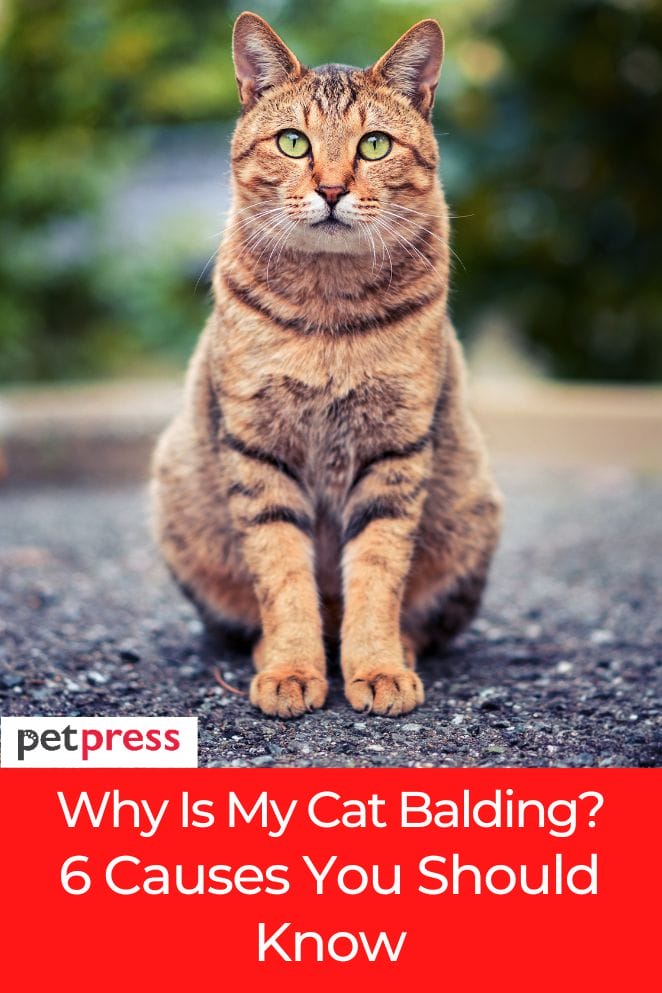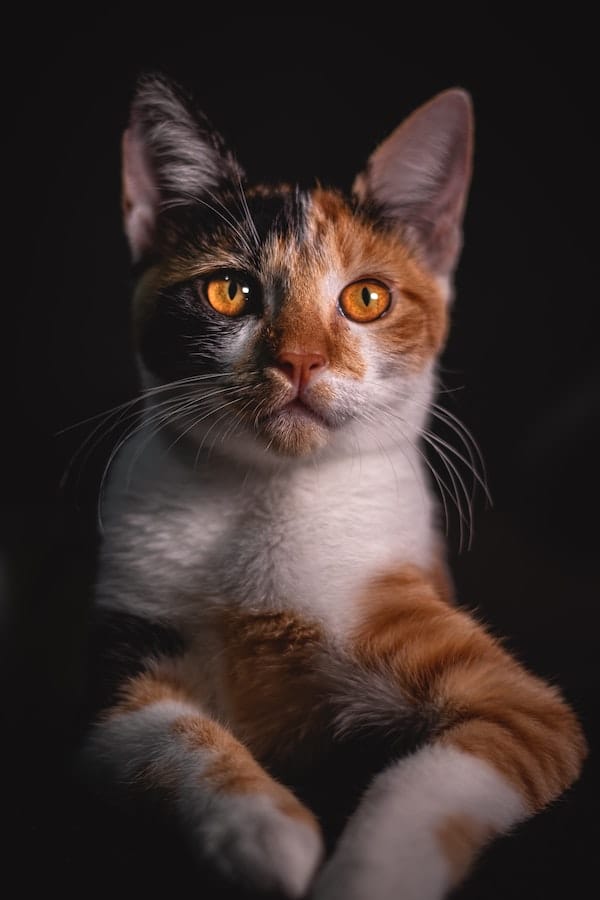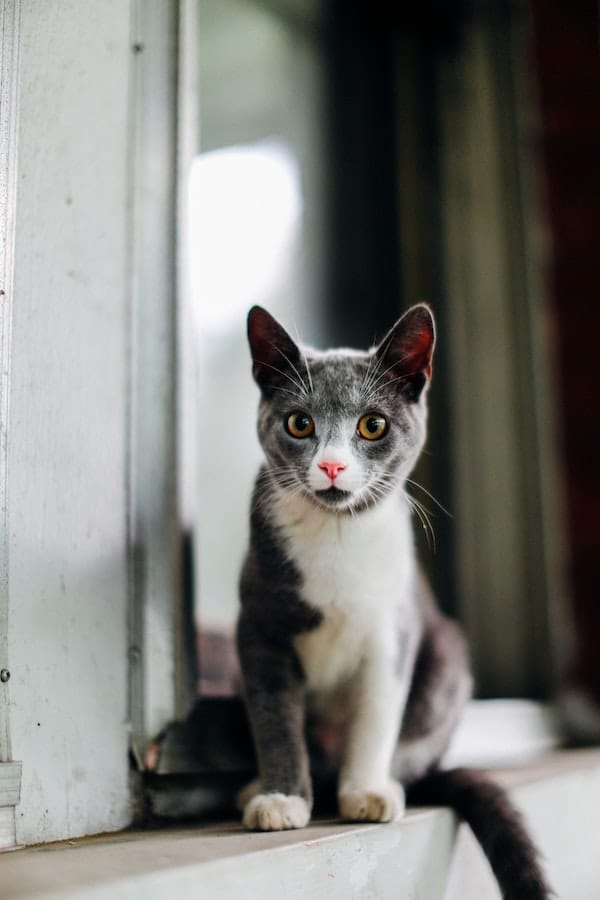
Discovering your beloved cat with patches of missing fur can be truly distressing.
Assuming you’ve at any point wound up inquiring, “Why is my cat losing hair?” you’re positively not the only one in your anxiety.
In the following article, we’ll leave on an excursion to investigate the multi-layered explanations for balding in our feline companions.
We’ll also uncover the indications that ought to be on your radar and examine practical strategies to guarantee your fuzzy companion keeps up with their tasty coat.
So, let’s dive in and unravel the mystery of cat hair loss together.
Causes of Hair Loss in Cats

Fleas and other parasites
Fleas, mites, and ticks are common causes of cat hair loss due to their irritating effects on a cat’s skin.
These parasites can lead to excessive scratching and, consequently, hair loss.
Fleas bite and irritate the skin, mites burrow into the skin, and ticks feed on a cat’s blood, all causing discomfort and prompting scratching.
Allergies
Cats can develop allergies to various substances, including food, environmental factors like pollen or dust mites, and even flea saliva.
Allergic reactions often manifest as skin problems, leading to itching, scratching, and hair loss.
Identifying the specific allergen can be challenging, but consulting with a vet is crucial for diagnosis and creating a tailored treatment plan.
Ringworm
Ringworm, despite its misleading name, is not a worm but rather a fungal infection that can affect both humans and our feline companions.
It manifests as these distinctive circular patches where your cat’s fur goes missing, often surrounded by red and scaly borders.
Think of it like an uninvited guest at a party; this fungus can linger in your cat’s environment and, upon contact with their skin, result in these telltale bald patches.
So, let’s debunk the myth of worms and get to the bottom of this fungal intruder affecting our furry friends.
Stress
Stress can be quite the troublemaker for our feline companions, leading to some peculiar habits like excessive grooming, which, unfortunately, can result in hair loss.
It’s like how we might reach for a tub of ice cream when we’re feeling stressed; cats have their own way of coping.
Changes in their surroundings, the sudden arrival of new furry friends, or even disruptions to their daily routine can be big stressors.
Hormonal imbalances
Hormonal imbalances in cats, such as hyperthyroidism or Cushing’s disease, can disrupt their coat health and cause hair loss.
Hyperthyroidism speeds up their metabolism like a race car, while Cushing’s disease puts their body in hyper-speed, resulting in hair loss as a symptom.
These imbalances can be compared to glitches in a finely tuned machine, impacting their once-fluffy coat.
Recognizing these issues early is essential to prevent further problems and ensure your cat maintains their fabulous fur.
Medical conditions
Medical issues like skin infections, autoimmune disorders, or cancer can be responsible for hair loss in cats.
Skin infections happen when bacteria or fungi infiltrate the skin, autoimmune conditions arise when the immune system targets the skin, and hair loss due to tumors is a potential consequence of cancer.

Signs of Hair Loss in Cats
To identify if your cat is experiencing hair loss, look out for these signs:
- Bald patches on the skin: Noticeable areas where fur is missing.
- Scratching and biting: Excessive scratching or biting at the skin.
- Red, scaly skin: Skin that appears irritated, red, or scaly.
- Itching: Your cat may repeatedly scratch or lick the affected areas.
- Diarrhea: In some cases, hair loss can be accompanied by digestive issues like diarrhea.
- Vomiting: Hairballs or underlying problems may lead to vomiting.
- Weight loss: Hair loss combined with weight loss can indicate a more serious issue.
How to Prevent Your Cat from Balding
Preventing cat hair loss involves addressing the underlying causes:
Flea control
Using flea prevention products recommended by your vet is crucial to prevent your cat from experiencing balding due to flea infestations.
Fleas can cause relentless itching and discomfort, leading to hair loss if left unchecked.
These prevention products can come in various forms, such as topical solutions, oral medications, or collars, and they should be administered regularly to maintain their effectiveness.
Allergy management
To prevent your cat from experiencing balding due to allergies, it’s essential to become an allergy detective.
Identify and eliminate allergens from your cat’s environment, such as certain foods, pollen, dust mites, or new products like detergents.
Your vet can be your trusted ally in this mission, running tests to pinpoint specific allergens and recommending treatments like allergy shots or medications.
Ringworm treatment
To ensure your cat doesn’t suffer from more hair loss due to ringworm, it’s crucial to consult a veterinarian.
Ringworm is a fungal infection known for causing circular patches of hair loss with red, scaly borders.
A veterinarian will diagnose the infection and devise a tailored treatment plan, possibly incorporating topical antifungal creams, specialized shampoos, or oral medications.
It’s also vital to isolate the infected cat and thoroughly sanitize their living environment to prevent the fungus from spreading any further.
Stress reduction
To prevent your cat from going bald due to stress-induced excessive grooming, it’s crucial to create a stable and comfortable environment for them.
Cats thrive on routine and stability, so minimizing sudden changes in their environment or routine is essential.
Providing enrichment through toys, scratching posts, and interactive play can stimulate their senses and keep them engaged.
Ensure a calm and quiet living space, and offer safe hideaways for your cat to feel secure.
Hormonal imbalance management
To assist your feline with keeping away from going bald prompted by hormonal imbalances, looking for guidance from your veterinarian is fundamental.
Hormonal imbalances can bring about unreasonable shedding and balding in cats.
Your vet possesses the expertise to diagnose the precise hormonal problem and develop a personalized treatment strategy.
This could involve medications, lifestyle modifications, or dietary adjustments as part of the solution.
Regular check-ups
To prevent your cat from going bald and catching potential health issues early, it’s crucial to schedule routine vet visits.
These visits serve as an early warning system, helping detect medical conditions before they become serious.
Your vet can give preventive measures, tailored care, and suggestions intended for your feline’s necessities, guaranteeing it stays healthy and blissful.
Conclusion
Witnessing your cherished cat undergo hair loss can be a worrying experience.
However, it’s crucial to remember that there are effective ways to address and handle this concern.
By identifying the root cause, staying alert to any symptoms, and taking proactive measures, you can play a vital role in ensuring your furry companion maintains the beautiful and vibrant coat they truly deserve.
FAQs
Yes, some cats may experience seasonal hair loss, usually during shedding periods. However, if hair loss is excessive, it’s essential to investigate further.
Occasional hairball vomiting can be normal, but if it occurs frequently or is accompanied by other symptoms, consult your veterinarian.
It’s best to consult your veterinarian before using any flea treatment to ensure it’s safe and effective for your cat’s specific needs.
Localized hair loss can still indicate underlying issues, so it’s advisable to consult your vet for a proper evaluation.
- Does Cat Litter Melt Ice? The Complete Guide to Winter Safety - January 30, 2026
- Happy Tail Dogs: Understanding This Common Canine Condition - January 29, 2026
- How Cold Can Outdoor Cats Handle? Feline Winter Safety - January 27, 2026


GIPHY App Key not set. Please check settings